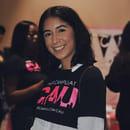An environment that challenges you, is always one that will move you in the right direction. This past week, I have been surrounded by a variety of promising women all offering perspectives on higher education, the steps to take, and what it all really means. A majority of these women, that I interacted with attend Spelman College, the #1 HBCU in the country, and CAU’s “sister” school across the bay.
The prestige that comes with Spelman College, is one that is noted as admirable and viable to the world of both HBCUs and PWIs. In fact, it is exactly what drew me into The Ivy League Conversation at hand. I was in a room with a few Spelmanites, with thoughts shared on “fellowships at Harvard” and “summer programs at Columbia”, that made me sit back reflectively, with nothing to add to the conversation. I wondered why I did not find my way into these conversations on my campus, in my home, or even within my own internal dialogue. I sat and focused on, what’s to it?
Regarding my upbringing, I knew the lack of resources was a result of being a first-generation college student. While many times my parents jokingly noted that I’d make it to Harvard to become the first woman POTUS, I always felt, deep down, like that would never be the case. Not just because I could never be a politician (lol), but because the concept of Harvard was so ambiguous, and because of that it always felt unattainable.
At my high school, resources were never provided on how to work your way up to any Ivy League dream, it was simply good enough to graduate, and go to any college you could. As I grew to understand the collegiate world in a way that my parents did not, I began to focus on statistics regarding acceptance rates, average ACT/SAT scores, and how that affected both my interest and desire to go. Therefore, as I explored my options, I never even thought to consider an Ivy League institution. There always seemed to be a more suitable fit.
However, now, as a Sophomore in college considering a graduate degree, I have this urge to push myself to explore all of my options. Yet, even with this motivation, I pondered on how to even begin to consider attending a college/university that averages an acceptance rate of 5% or less. After conversations with my friends and collegiate peers, I narrowed down what is exactly needed to formulate the thought to pursue an Ivy League education, in a setting where the thought has never occurred.
-
Find A Way Or Make One
Going full force with CAU’s school motto, nothing can be done unless you do it. I learned I needed to start the conversation. Find your resources, find people to talk to about their experiences, and then make a way for the journey to make sense to you. Leaving the concept as unfamiliar will allow us to do nothing but continue to push the thought aside, steering us away from applying.
2. Know What The Institution Can Offer YOU
While Ivy Leagues are definitely prestigious and promising, I never support going to college/university just for the name. Knowing what degree you’d like to pursue, in what major, will really allow you to concentrate on if you want to go to an Ivy League school for the hype, or for a future that is beneficial to you.
3. Get There In Undergrad
One thing I never did during my undergraduate college search was taking the time out to visit campuses. I highly regret not taking those extra steps because online tours and Youtube videos will only tell you so much. As I consider a Master’s Degree, at any institution (Ivy League or not), I plan to tour as much as possible. Doing so will gage my comfortability and again affirm if the school is really for me.
What truly promotes conversation is education and understanding. The only way these conversations can be normalized is if we really engage in having them by sharing our input and our resources on the topic. In the collegiate world, there should be no thought that stops you from achieving a huge aspiration, realistic or not. A lot of us have already made it as far as undergrad, so nothing should stop us now.


